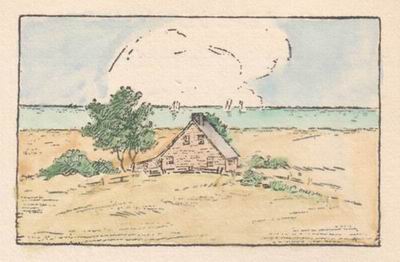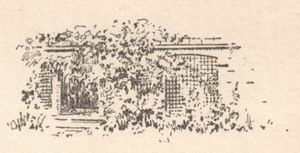| Copyright, Kellscraft Studio 1999-2003 (Return to Web Text-ures) |
Click
Here to return to Cape Coddities Content Page Click here to return to Previous Chapter |
 (HOME) |
| Copyright, Kellscraft Studio 1999-2003 (Return to Web Text-ures) |
Click
Here to return to Cape Coddities Content Page Click here to return to Previous Chapter |
 (HOME) |
 II THE CASUAL DWELLING-PLACE Is there a reader who has not at one time or another gloated over the terrors, the thrills, and the mysteries which, in fiction, invariably lie hidden in an unoccupied house? When one stops to think of it nearly all the literature of roguery, as so clearly set forth in former days by Wilkie Collins, Gaboriau, down to Conan Doyle and Mary Roberts Rinehart, possesses as its most important stage-setting an untenanted mansion. It may be one of those familiar villas generally located somewhere near Hampstead Heath, a house set apart from its neighbors and surrounded by a hedge; a house with every appearance of having been closed for several years and now showing the first signs of decay; or it may be one of those somber brownstone houses situated in one of the many New York residential streets, where every house so closely resembles its fellows as to court mischief to all who may return late at night; or again, it may be one of those palatial country houses set among lawns and gardens which are invariably described with broad, magnificent porticoes toward which spotless limousines are continually approaching at top speed for no apparent reason. Such a setting is perhaps the commonest, and the time is always just before the family arrive for the season or just after they have left for other equally expensive quarters. Now and then the novelist will modestly cast the fate of his story in the seclusion of a deserted cottage by the sea or a lonely hut among the hills, but rarely does this occur nowadays. The mystery story is as dependent upon luxury of setting as is the modern bachelor upon his creature comforts. And, therefore, if the devotee of fiction chose to apply himself to this theme he would find that nearly all novelists, great and small, from Dickens to Oppenheim, from Hawthorne to Anna Katharine Green, have utilized the empty house to bring about the climactic point in the weaving of some gruesome tale. So clear are these fictional features that, by the association of ideas, one's fears and apprehensions are invariably aroused whenever the occasion arises when an unoccupied house or even an untenanted apartment must be entered. With that unmistakable odor of mustiness comes afresh this uncomfortable sense of trepidation (hardly fear, perhaps), and with it a conviction that rats and mice are hidden spectators, and that the darkness and gloom could well hide crime as well as the thieves themselves. This entire mental state is largely caused by the aforesaid novelists, who I doubt not would have the same hesitancy in opening the door of a darkened chamber or in groping down the cellar stairs of a house long left to disintegration. In short, reading has trained us all to regard empty houses with suspicion, an absurd state of mind which should be quickly dispelled, for in the case of nine out of every ten, yes, or ninety-nine out of every hundred houses, there is no cause whatever for suspicion. There is a sunny little house on the shores of Buzzard's Bay which remains unoccupied except for ten weeks in the summer. Its shutters are closed and fastened long before the oaks have turned to their gorgeous fall colorings or the marigolds and phlox have lost the freshness of their bloom. The soft, salty breeze, rippling the waters, the dancing rays of the September sun through the swaying pines, give a joyous setting to this cottage by the water, courting as it were an occupant. The hardiest of that over-worked class of readers who rely upon mystery stories would find it difficult to conjure up a tragedy for such a spot. The native Cape-Codders, knowing the owners, always glance over toward the cottage as they pass by in the hope the cottage as they pass by in the hope of finding a blind open or a light through the trees, to show that some of "ther fam'ly be down for Sunday." For this is one of the important services which this particular cottage renders to its owners. As the scion of the family (aged ten) once sagely remarked, “We use the cottage more when it 's closed than when it 's open." And to each and every member of this house its welcome is always the same. The family reach the house after dark on a Saturday night. The lock readily responds to familiar fingers, the door creaks a friendly welcome as the family grope their way through the hall in good-humored rivalry to see which shall be the first to secure the box of matches always kept on the right-hand corner of the mantelpiece in the living-room for this emergency. Then, as the lamps are lighted, the old familiar objects appear precisely as they had been left, perhaps six months before, with a coating of dust, to be sure, but nothing which a few moments and a dust-cloth could not remove; for dust in this region is little known. True, the chairs, or at least such of them as possess cushions, are shrouded in covers. The sofa is a bulging conglomeration of cushions, gathered from all hammocks and piazza furniture; but a few deft passes by the fairy godmother of this establishment, and presto, the cushions are distributed and the sofa offers a cozy retreat for the entire party. Otherwise the living-room is livable. A fire ready laid is only waiting for a match and a turn of the hand to open the flue. Such is a cottage by the sea if it has been planned and built as it should be, not alone for summer use, but also for spring and autumn holidays. The little cottage in question is a very ancient affair. A long line of sturdy Cape-Codders dwelt in it, uncomfortably, for generations. It was not until a few years ago that it was entirely renovated, enlarged, and equipped for summer use. Much care and thought were given to its convenience, and it stands to-day as a model for perennial use as a casual habitation. But it has certain draw backs; as, for instance, plaster. Such a cottage, to secure the maximum comfort with the minimum of expense, should be unplastered, and without a cellar so that the circulation of air will keep the house free from dampness. There should be a kerosene cooking-stove in the kitchen so that the cooking can be done without jeopardizing the water coil or boiler. Furthermore, unless one's family and friends are experts in the culinary art, the usual stove fire is built regardless of the cost of coal or kindlings, and the fire itself is apt to take a good deal of time in the making, several trials often being necessary before the coals kindle into a respectable glow. The problem of water is perhaps the most troublesome. No house, of course, can be left with the water on during the winter season. These Cape cottages are no exception to the rule, and every pipe is carefully drained and the faucets greased to prevent rust. To go to the trouble of turning on the water system for an occasional Sunday or holiday was manifestly out of the question, and so the owner of this particular cottage solved the difficulty in true backwoods fashion. A small stone tank, placed in the closet behind the stove, holding not over five gallons of water, was always religiously filled. This served as lubricant for a hand pump at the kitchen sink. One of the first duties in starting in housekeeping was to heat a pail of this water, thaw out the pump, and thus secure the supply which adequately filled the family needs for the day or two of camp life to be enjoyed. You will ask what of bedding and blankets? They are there at hand. As a matter of fact, the less one puts away the better for each and every article. All blankets hung upon ropes stretched across the attic are dry and ready for use. Upon such occasions as the one noted, the family do without sheets and sleep fully as soundly. The blazing of the fire logs and the warmth of the living-room have given to all a drowsy feeling which defies wakefulness when once the head touches the pillow. If any one should contemplate making use of his summer house in this fashion, there are certain suggestions which it would be well to follow; points which any yachtsman or camper would never overlook. First of all, there should be a place for everything and everything should be in place. You can never tell when you will return. Perhaps you may be delayed and not arrive until after dark, chilled and hungry from a long motor ride. At such times a fire ready laid, with a good store of dried wood, is essential to happiness and comfort. There should always be a list of provisions left at the house so that you may avoid duplication in purchasing supplies. Besides food, there should also be such necessaries as soap, matches, and candles. These should always be left in the boxes to prevent the mice and squirrels from robbing one. A good scheme is to build a zinc-lined cupboard in the pantry in which to keep such perishables. Kerosene is dangerous to leave about, and it is well to bring this with you for the cook-stove; furthermore, it is hard to remember whether enough has been left at the house for twenty-four hours' use. Care should always be taken to leave the small water tank filled unless you plan to secure your supply from a friend or neighbor. Your pots and pans, cutlery, dishes, and glasses should always be washed and put away in order before leaving, ready for instant use. A little system will make all the difference in the world in the comfort and enjoyment of such an outing, and will save labor, so that your actual work will be done in much less time and the daylight hours can be given over to the outdoor life which endears the place to each and every member of your family. Whether it be a canoe, a knock-about, a gun, or a fishing-line, the life outside the cottage will be a reflection of that within and your enjoyment will come from the facility with which you manage the essentials of simple living. And so after you have enjoyed your day in the open, you will return to the cottage and discover that the simple comforts which it offers, while perhaps lacking the luxury of your daily routine at home, will be enjoyed with a relish far beyond that existence in a brick block, amid a mass of bric-a-brac and surrounded by servants. In its place you will devour an unusual amount of food which tastes the better because you have cooked it, and later you will fall asleep with the wind singing in the trees, and the waves lapping the shores. The occasional barking of a dog will arouse no apprehension, and the dread of haunted houses, of mysterious deeds accomplished behind closed shutters, will have vanished until you are safe home again with a "thriller" to pass away the time before it is seasonable to retire. 
|